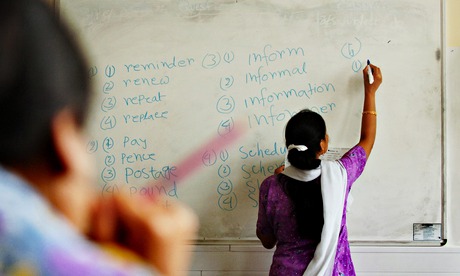dibo
Well-Known Member
As you all know, I tend to get a bit pedantic about English on here. Below is an article talking about English in the UK for migrants, and talking about the importance of good English for opportunities for social mobility.
It's an interesting read, and also ties into a feeling I have that good English (encompassing good speech and good writing - including grammar, spelling and punctuation) is essential to social mobility.
For all that it is derided as being the prevail of pedants and pains in the arse, clear and correct writing and speech are usually most notable by their absence. When someone speaks or writes poorly, it can lock them out of any number of jobs (particularly, but not exclusively white collar jobs) and restrict their opportunities and access to many other social goods.
This doesn't mean that you *can't* succeed, but closing off any opportunity means your chances are necessarily diminished.
It's an interesting read, and also ties into a feeling I have that good English (encompassing good speech and good writing - including grammar, spelling and punctuation) is essential to social mobility.
For all that it is derided as being the prevail of pedants and pains in the arse, clear and correct writing and speech are usually most notable by their absence. When someone speaks or writes poorly, it can lock them out of any number of jobs (particularly, but not exclusively white collar jobs) and restrict their opportunities and access to many other social goods.
This doesn't mean that you *can't* succeed, but closing off any opportunity means your chances are necessarily diminished.
It makes liberals nervous – but good English is about social mobility, not Ukippery
Most of us think language skills are a vital part of Britishness, according to a survey. But employability and liberty are the real issues

Suzanne Moore
theguardian.com, Tuesday 17 June 2014 20.23 AEST

'I still see kids taken out of school or college to translate for their mothers. They become carers of perfectly able women who cannot attend a simple doctor’s appointment by themselves.' Photograph: Linda Nylind for the Guardian
When I left hospital after the birth of my second child, it was clear that the woman in the bed opposite me would not be leaving hospital for some time. There were, said my lovely midwife, several "complications". She was frustrated because the woman had received no antenatal care. Nearly all of these complications could have been avoided but like so many women who do not speak English she was off all medical radar until she was rushed into A&E in labour by male relatives. The conversations were held in a place where most of the doctors and nurses spoke English as a second language. And spoke it well. But they could not bring in a translator for this terrified woman at 3am to explain an emergency caesarean.
When I see the British Social Attitudes survey, with 73% of people saying to be "truly British" it is very important that people speak English, I sense the nervousness of liberals that this is verging on Ukippery. But it is not simply "immigrants " who need to speak English – we have many white working class children who are now also suffering because of poor language skills.
This an issue that hinders mobility socially and physically. For years my neighbour was a woman who moved here from Cyprus in the 50s. Her children and grandchildren spoke English and while she was always kind and smiled at me, her sons told me she prayed for me. She could not tell me herself and as she aged she became housebound, not through physical disability but by not being able to leave the house unchaperoned. I still see kids taken out of school or college to translate for their mothers. They become carers of perfectly able women who cannot attend a simple doctor's appointment by themselves. So I see women in particular held back because of their lack of English. Without it there is no liberty, and no access to a social and cultural life beyond the home.
What is problematic is that under the rhetoric of being tough on immigration, the learning of English becomes somehow punitive. According to the last census there are about 8% of people whose main language is not English (or Welsh). Translation services have been cut by this government but they have not been replaced with anything like enough English as a second language (Esol) courses.
Instead there has been a series of threats to cut benefits to those whose lack of English makes them unemployable. The reality is that many who have poor English are employed in low-paid jobs as care workers. And this is really problematic.
Linking the speaking of English to employability, opportunity and choice is far more productive than trying to define it as an essential component of "Britishness". Britishness means for many being bilingual in order to exercise the freedoms we are said to cherish.
Most of us think language skills are a vital part of Britishness, according to a survey. But employability and liberty are the real issues

Suzanne Moore
theguardian.com, Tuesday 17 June 2014 20.23 AEST

'I still see kids taken out of school or college to translate for their mothers. They become carers of perfectly able women who cannot attend a simple doctor’s appointment by themselves.' Photograph: Linda Nylind for the Guardian
When I left hospital after the birth of my second child, it was clear that the woman in the bed opposite me would not be leaving hospital for some time. There were, said my lovely midwife, several "complications". She was frustrated because the woman had received no antenatal care. Nearly all of these complications could have been avoided but like so many women who do not speak English she was off all medical radar until she was rushed into A&E in labour by male relatives. The conversations were held in a place where most of the doctors and nurses spoke English as a second language. And spoke it well. But they could not bring in a translator for this terrified woman at 3am to explain an emergency caesarean.
When I see the British Social Attitudes survey, with 73% of people saying to be "truly British" it is very important that people speak English, I sense the nervousness of liberals that this is verging on Ukippery. But it is not simply "immigrants " who need to speak English – we have many white working class children who are now also suffering because of poor language skills.
This an issue that hinders mobility socially and physically. For years my neighbour was a woman who moved here from Cyprus in the 50s. Her children and grandchildren spoke English and while she was always kind and smiled at me, her sons told me she prayed for me. She could not tell me herself and as she aged she became housebound, not through physical disability but by not being able to leave the house unchaperoned. I still see kids taken out of school or college to translate for their mothers. They become carers of perfectly able women who cannot attend a simple doctor's appointment by themselves. So I see women in particular held back because of their lack of English. Without it there is no liberty, and no access to a social and cultural life beyond the home.
What is problematic is that under the rhetoric of being tough on immigration, the learning of English becomes somehow punitive. According to the last census there are about 8% of people whose main language is not English (or Welsh). Translation services have been cut by this government but they have not been replaced with anything like enough English as a second language (Esol) courses.
Instead there has been a series of threats to cut benefits to those whose lack of English makes them unemployable. The reality is that many who have poor English are employed in low-paid jobs as care workers. And this is really problematic.
Linking the speaking of English to employability, opportunity and choice is far more productive than trying to define it as an essential component of "Britishness". Britishness means for many being bilingual in order to exercise the freedoms we are said to cherish.

 Cymru am byth!
Cymru am byth!